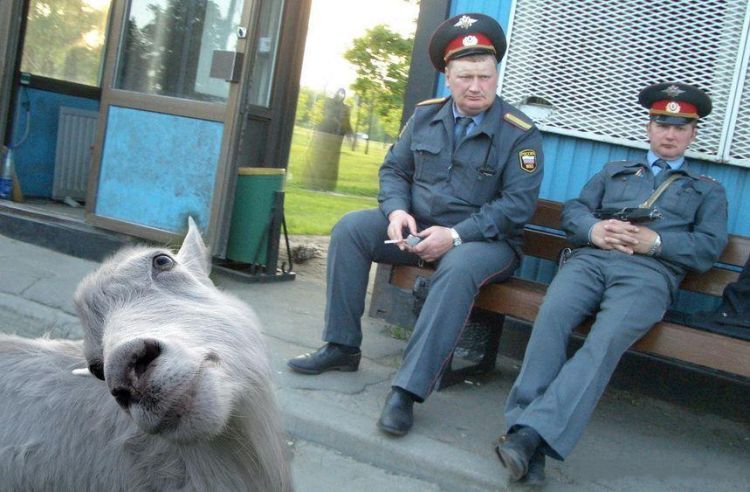Uncategorized
Reading Russia: The Idiot and The Brothers Karamazov
 It’s very hard for me to separate these two books in my mind. Elements of each strike me for their similarity: the characters Prince Myshkin and Alyosha Karamazov, Nastasya Filippovna and Agrafena Svetlova, Parfion Rogozhin and Dimitri Karamazov, Gavrila Ivolgin and Ivan Karamazov; there is some sort of complicated love triangle between everyone; someone is murdered in a gruesome fashion (by knife and by pestle); and so on.
It’s very hard for me to separate these two books in my mind. Elements of each strike me for their similarity: the characters Prince Myshkin and Alyosha Karamazov, Nastasya Filippovna and Agrafena Svetlova, Parfion Rogozhin and Dimitri Karamazov, Gavrila Ivolgin and Ivan Karamazov; there is some sort of complicated love triangle between everyone; someone is murdered in a gruesome fashion (by knife and by pestle); and so on.
The heft of these books encourages me to take them on long journeys, so that I may always have words to read. I want to wear them on my feet and grow two inches taller, because I am only 5’6″ and I read a study somewhere that taller people tend to make more $ in the business world. I want to hollow out these books and store smaller books inside of them and even smaller books inside of those books. These are the kinds of books that make me wish I could escape from writing stories that involve two people saying stupid things about sperm whales to each other. These are the kinds of books that make me miss good storytelling.
As I was reading both of these books, I often found myself sincerely worrying about the characters: I hope the prince recovers! If only Ivan had not left for Moscow, the fool! Will anyone suspect Smerdyakov? I followed the relationships between the characters very closely, and I recall feeling emotions for these characters. There are two scenes that really affect me, and I’ll talk about them below.
There are not many recent, enormous contemporary social novels that have affected me this way, except for Infinite Jest and maybe some others that I cannot name right now – my bookshelf is currently full of story collections and other short books, so I’m not really reading big social novels anyhow. Maybe that’s why. But I have to admit that reading The Idiot and The Brothers Karamazov creates in me a different effect than when I read the work of, say, Gary Lutz, or I don’t know, who else? My point is this: it was a relief to be able to feel concern for characters as if they were real people. I don’t know why, but it felt good to worry about them. See, when I read Lutz, different parts of my body light up, specifically, parts in my head. It is a different kind of reading that I apply to Lutz’s pages: more grammatical/mechanical, less concerned with the fleshy bits. Is anyone familiar with what I’m describing? I’m curious to know if others have found themselves enjoying a suddenly different way of reading? I mean really enjoying it because it is refreshing and new? And by new, I mean, it is how I used to read long ago, before I tried to write for myself?
 Here are two passages that affected me in the old way (with light commentary to give you an idea as to what I’m talking about). In the first passage, Nastasya Filippovna has just tossed one hundred thousand roubles in the fireplace and commanded, Ganya, her doomed suitor, to claim the money if he wishes. If he will crawl into the fireplace to retrieve the package before it burns, he may keep all of the money, but to do so would be to humiliate himself in front of the party of people gathered at the apartment. This is Nastasya’s revenge upon him for his pursuing her because of her large dowry, even though he is ashamed of her reputation.
Here are two passages that affected me in the old way (with light commentary to give you an idea as to what I’m talking about). In the first passage, Nastasya Filippovna has just tossed one hundred thousand roubles in the fireplace and commanded, Ganya, her doomed suitor, to claim the money if he wishes. If he will crawl into the fireplace to retrieve the package before it burns, he may keep all of the money, but to do so would be to humiliate himself in front of the party of people gathered at the apartment. This is Nastasya’s revenge upon him for his pursuing her because of her large dowry, even though he is ashamed of her reputation.
But Ganya had been through too much that day and evening and was unprepared for this final, unlooked-for ordeal. The crowd parted in front of them and he was left face-to-face with Nastasya Filippovna, about three paces from her. She was standing right by the fireplace, waiting, her burning, piercing stare fixed upon him. Ganya, in his dress clothes, hat and gloves in hand, stood mutely looking at the fire with his arms folded. A mad smile hovered over his face, white as a sheet. True, he couldn’t take his eyes off the fire and the smouldering package, but it seemed that something new had entered his soul; it was as if he had sworn to withstand this torture; he did not move from the spot; after a few seconds it became clear to them all that he would not go for the parcel, that he had no wish to do so.
By the end of the scene, the climax of Part I, Ganya faints from the inner turmoil caused by his struggling to resist the money in order to save his pride, but Nastasya Filippovna departs with his rival, Rogozhin. Sorry if this is confusing? I think you have to have read the book to really follow me here, because this scene is important because of how strongly we see Ganya suffer (thus making the later violence of the book possible), but I think you can still get a sense of what Dostoevsky is doing with the two of them face-to-face, the mad smile, torture, etc. It’s a moment of extreme emotion (shame, pride, greed, etc. etc.) and Dostoevsky describes it well. Interesting to me are the various phrases (‘white as a sheet’ for example) that appear in the text, phrases that strike us (just me?) now as ’empty’ and ‘useless.’ But I don’t mind them here. I don’t know why, to be honest. Anyone?
This second passage is from The Brothers Karamazov and it surprised me for personal reasons. It’s a bit of a rant by the father of the brothers, Fyodor Karamazov. He’s speaking to the Elder Zosima a sort of weird, anxious standup routine, and the Elder tells him to not be ashamed of himself, to which Fyodor responds:
…When I go among people I do indeed always feel that I’m more vile than any of them and that they all take me for a buffoon, and so I say to myself: “Very well, I really will play the buffoon, I’m not afraid of what you think of me, because you’re all of you to a man more vile than I!” That’s the reason I’m a buffoon, it’s shame that makes me so, great Elder, shame. From pure mistrust do I play the lout.
This speech, which reminds me of the narrator from Notes from the Underground, shook a little bit of myself out of my safe space. Look, there is something I recognize here: this desire to protect myself from ridicule because I cannot bear shame, even though I tend to seek it out. Others cannot ridicule my selves/ideas/appearances if I know that the selves/ideas/appearances I’ve presented are not serious. Fyodor, for this reason, is my favorite character in the book, even though I don’t relate well to his voluptuousness. This shaming of myself is something I struggle with (I’m not claiming it all for my own – I imagine others do the same), and then I foolishly wonder why in other, more serious situations I’m discounted as a worthy participant. I wonder how badly I’ve hurt myself trying to protect myself? I don’t think it really matters; it is yet another thing to torment myself over.

Thank you for reading my blog post about The Idiot and The Brothers Karamazov. Up next: We by Yevgeny Zamyatin.
Tags: Russia

Ivan’s devil is my favorite devil in literature.
Ivan’s devil is my favorite devil in literature.
This is interesting to me, because one of the reasons I was so excited to get involved with this blog last November (which I think is when I got involved) was because, largely ,the focus here on writing is so different from my recent concerns with writing- which is storytelling, morality, and LIFE. I love how many of the contributors and commenters here- without totally ignoring such issues, of course- focus largely on language, experimentation, breaking boundaries and so forth. Those were things I was concerned with for a good part of my twenties but really grew away from later. I love being reintroduced to the importance of such things.
That said, great post Ryan. I love when my heart beats fast out of worry for a character, when I have to put the book down and walk away. When I can’t stop thinking about the PEOPLE in my mind.
I’m finishing Animal Factory thanks to Jereme’s post about it. It’s all about the people.
But it’s all good. And I want to reiterate- focus on language and innovation do not neccessarily mean a lack of care about life, characters and so forth. But the focus is relevant. And for me, at this stage (my birthday is coming up, 41 mutherfuckas! -send presents!) it’s all good. It’s not that I don’t have a “taste” anymore, but my tastes continue to broaden, in some ways, even if I still have preferences.
Another great Dusty post. Also the above comment I agreed with. It’s fun to play and fuck with language but in the end it needs to tie in with human concerns or else what’s the point. I like someone like Barthelme for his inventive use of language and all that, but than grow tiresome if there’s not something more their to engage with or something.
Another great Dusty post. Also the above comment I agreed with. It’s fun to play and fuck with language but in the end it needs to tie in with human concerns or else what’s the point. I like someone like Barthelme for his inventive use of language and all that, but than grow tiresome if there’s not something more their to engage with or something.
amen to that.
amen to that.
hey pr and johnny,
thanks for reading and commenting
yeah, i just want to clarify a point; i dont mean to say that something languagey like the lutz is devoid of humanity and people and so on – some of my most intense personal emotions have come from reading that langauge and admiring it, because it is so pleasing to me in my head how it was put together, and to know that a human came up with that language screws me up. so i dont want to suggest that there is a complete difference between the two or that i think one is ‘better’ than the other. not that you’re saying that, you know, but i felt like i should just add that.
barthelme is a good example, i think, of this, johnny. at his best, at least my favorite stories of his, do, for me, connect to a human concern. everyone often cites the balloon or the school, etc, as examples of that, and i agree that they both are playfully concerned with langauge (the comic progression in the school, for example) while also connecting to the humanness thing.
and: even the most obscure, experiemental work to me is human in some way, because of its process of origin, i think, because of that i am affected by it.
anyhow, it was just nice to read a story in the most conventional sense of the word, i think.
hey pr and johnny,
thanks for reading and commenting
yeah, i just want to clarify a point; i dont mean to say that something languagey like the lutz is devoid of humanity and people and so on – some of my most intense personal emotions have come from reading that langauge and admiring it, because it is so pleasing to me in my head how it was put together, and to know that a human came up with that language screws me up. so i dont want to suggest that there is a complete difference between the two or that i think one is ‘better’ than the other. not that you’re saying that, you know, but i felt like i should just add that.
barthelme is a good example, i think, of this, johnny. at his best, at least my favorite stories of his, do, for me, connect to a human concern. everyone often cites the balloon or the school, etc, as examples of that, and i agree that they both are playfully concerned with langauge (the comic progression in the school, for example) while also connecting to the humanness thing.
and: even the most obscure, experiemental work to me is human in some way, because of its process of origin, i think, because of that i am affected by it.
anyhow, it was just nice to read a story in the most conventional sense of the word, i think.
Ryan – yes-
I wrote something like – “focus on language and innovation do not necessarily mean a lack of care about life, characters ” blabla- so we are in agreement. But what I did adress is “focus”. And what I meant by that is primary focus, and that it is all good.
I keep meaning to write a longer thing on how innovation- primarily modernism- began as a way to further emotional intensity and human experience, and like most things, got a bit lost in the way, or even, inverted the original intent of the innovation. In other words, a huge change in the aspects of writing began- not exclusivlely, but whatev- in conjuction with Freud (same time), as a way to get to deeper emotional truths, and then morphed into its own thing, which is a beautiful thing, but deeply changed from the origin of the initial “punctuated equlibrium” thing that first occured in writing.
really great post
really great post
ot: i wanna punch that goat.
ot: i wanna punch that goat.
i liked “the devils/the demons”
i liked “the devils/the demons”
Yes, great post, Ryan. I appreciate the way you explained that Dostoevsky and Lutz are indeed different reading experiences, and that both are valuable in their own respects. It’s not either/or, but each on its own terms. Nice work.
Yes, great post, Ryan. I appreciate the way you explained that Dostoevsky and Lutz are indeed different reading experiences, and that both are valuable in their own respects. It’s not either/or, but each on its own terms. Nice work.
thanks man.
thanks man.
Hey Ryan, Great post. Thank god we can–as you point out–like different books for different reasons. Christ we might as well all be reading Billy Collins all the time, otherwise. I’ll toss Crime and Punishment into the heap. It’s the cliched Dostoevsky, sure. But damn, it’s a good book. I don’t care what anybody says or thinks about that (I will fuck those people up, anyway–physically, that is).
Hey Ryan, Great post. Thank god we can–as you point out–like different books for different reasons. Christ we might as well all be reading Billy Collins all the time, otherwise. I’ll toss Crime and Punishment into the heap. It’s the cliched Dostoevsky, sure. But damn, it’s a good book. I don’t care what anybody says or thinks about that (I will fuck those people up, anyway–physically, that is).
c/p is on my list for sure. im taking a break from D. right now though and am reading a hero of our time by lermontov. thanks for reading jamie.
c/p is on my list for sure. im taking a break from D. right now though and am reading a hero of our time by lermontov. thanks for reading jamie.
the psychological/self honesty of your past couple posts is disarming me emotionally.
the psychological/self honesty of your past couple posts is disarming me emotionally.
The srory under this link contains unexpected historical facts behind Dostoevsky’s novel “Idiot”:
http://www.netmox.net/main.php?siirry=27&sivulle1=Go –
The srory under this link contains unexpected historical facts behind Dostoevsky’s novel “Idiot”:
http://www.netmox.net/main.php?siirry=27&sivulle1=Go –